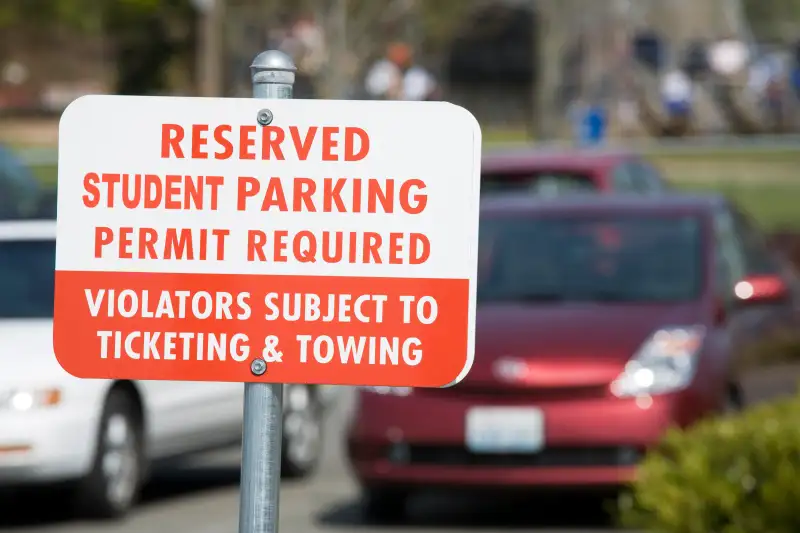Car Insurance for College Students: 3 Ways to Be Safely Covered For Less

If you’re sending a kid to college with a car this fall, their auto-insurance coverage probably isn't top of mind, especially given the many curves the coronavirus is throwing into campus planning. Yet the pandemic makes it more important than usual to review your student’s car insurance, because its disruptions may change their driving and what it costs to insure it.
Like many other aspects of campus life, driving patterns may differ for college students this year, and that might require adjustments to their car insurance. Students who live off-campus, perhaps because of dorm restrictions or concerns, may drive more, especially if they’re concerned about riding public transit to school. Having some or all classes held virtually might encourage students to spend more time at home with the family, and that change of location could affect where and how much they drive.
Even in normal times, a campus car-insurance checkup is a smart summer move that ensures you’re getting the right coverage at the lowest cost. Here are the three steps to follow.
Notify your agent or insurance company
Before doing anything else on this list, contact your insurance company or agent and let them know where your student will be attending in the fall, and whether they’ll be driving.
Assuming they will be taking a car to school, “reporting the new location where the car will be kept is necessary to ensure full coverage in the event of an accident or theft,” according to independent agency Grange Insurance. If the vehicle is already on the policy, it can be kept on the insurance policy, provided the student’s permanent address while at school remains the family address. That’s generally the best course, and certainly the simplest.
However, if the student will drive a new vehicle — or one that’s new to the family, at least — the name that’s on the vehicle ownership may determine whether the vehicle can ride along on the family policy. As Allstate’s advice to students on insuring a car for college puts it, “If your name is on the title, you'll likely need to buy your own car insurance policy in your name. If the car is jointly titled — it contains your name and a parent's name — you may be able to stay on your parent's car insurance policy.”
Upshot: if you’re planning to buy a car for college this year, reach out to your insurer first, especially if you’re considering having your student own or co-own the vehicle they’ll drive.
Get the benefit of student discounts
A number of price breaks aimed at student drivers can deliver big savings, given that the cost to add an 18-year-old driver to a full-coverage family car insurance policy averages $1,200 for a daughter and $1,500 for a son, according to carinsurance.com.
According to online independent insurance vendor Policygenius, all major insurance companies offer discounts to high schoolers or full-time college students who are under 25 (or sometimes 23, as with Progressive) and can show evidence of their academic achievements. Depending on the insurance company, that might involve showing a grade average of B or a GPA of 3.0, high test scores on the SAT, ACT, or PSAT, a letter signed by an administrator testifying to your academic achievements, or a ranking in the top 20% of the class.
Savings are typically 10% to 15%, according to Policygenius, but some companies offer more — including State Farm, which promises a discount of up to 25%.
You can also benefit if your student joins certain campus organizations. Policygenius notes that some insurers, like GEICO, offer discounts to members of certain fraternities, sororities, and honors societies.
What if your student is going to school and not taking the car they drive at home along with them? There’s a discount for that, too. So-called “distant-student discounts” kick in if your scholar is studying at least 100 miles from home. They typically provide a break of between 15% and 30%, according to carinsurance.com. Check, however, for age restrictions. For example, Progressive allows the discount only for those who are 22 or younger.
Taking the distant-student discount is generally a better option than dropping the student entirely from the policy while they’re away at school. For one, the continuing coverage will allow him or her to drive when they’re home for weekends and for holidays.
But there’s another plus to keeping a student on the policy, according to Diane Borden, an executive with insurance consulting firm Woodruff Sawyer. Insurance companies dislike patchy insurance histories, Borden says. “Having continuous auto coverage provides additional savings for students when they are ready to purchase a vehicle of their own. They can show that there wasn’t any gap in their insurance protection versus being rated as a brand new driver.”
Older car? Consider reducing coverage
The family’s youngest driver often pilots its oldest vehicle. If the car that’s headed to college is sufficiently old, some optional components of its policy may no longer make much financial sense. You can save significantly on premiums by dropping them.
The coverage types in question are what’s known as Collision and Comprehensive. Often bought together, but also available separately, Collision covers the cost of damage the driver does to their own vehicle, while Comprehensive covers theft and repairing what Mother Nature and bad luck might cause, including cracked windshields and hail damage.
While rates vary widely by state, the average combined premiums for “C&C'' coverage are about $425 a year, according to the Insurance Information Institute. Consumer Reports is among the expert sources that recommend dropping “collision and/or comprehensive [coverage] when the annual premium equals or exceeds 10% of your car’s cash value.” Using that measure, and assuming you pay average premiums, you might consider dropping C&C coverage if the car your kid will be taking to college is worth less than about $4,500.
A few caveats are in order, though. Before dropping these policies, consider: If the car was lost or damaged, whether to theft or in a crash caused by your student, would you be able to cover the cost with what’s in your bank account or is otherwise readily available? If not, you might want to think twice about the move. Also, if the car is financed, “you may be required to purchase both collision and comprehensive coverage” by the lender, the Insurance Information Institute warns.
More from Money:
Why Coronavirus Auto Insurance Price Breaks Could Be Here to Stay
A Six-Step Guide to Asking Your College for More Financial Aid This Year=



